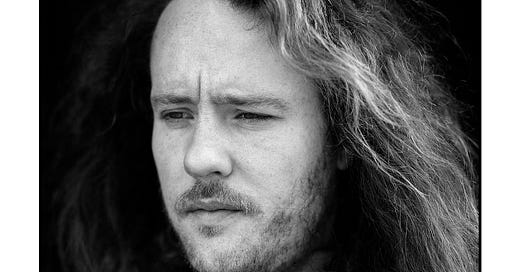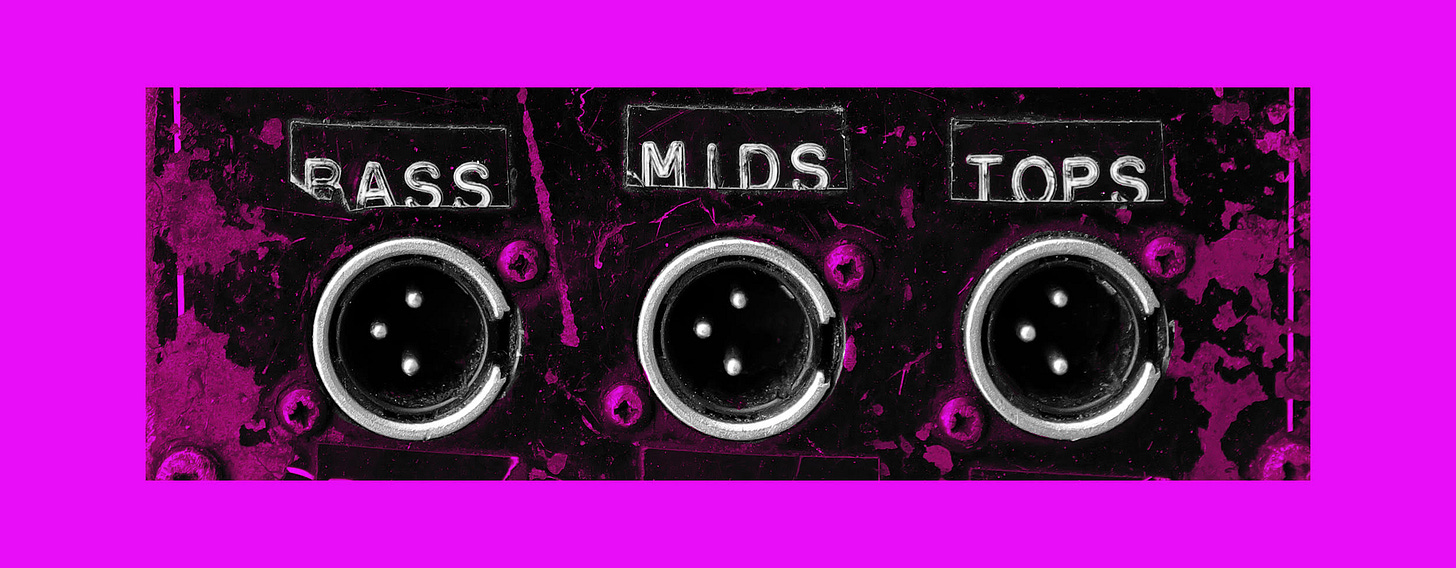Well look here, we actually have another topical one! We’ve mainly kept well away from the promo circuit and followed our noses but sometimes it’s natural that we alight on someone who has a record to promote. And what a record Joe Armon-Jones has for you. This week, the keyboardist, producer and composer releases PART ONE of All the Quiet, his vast and gorgeous dub-jazz epic of apocalypse and revolution, which with Part Two later in the summer will add up to two hours of music, all clad in artwork of 1970s levels of excessiveness1 and featuring maverick guests like Asheber, Greentea Peng, Wu Lu, Hak Baker and Yazmin Lacey among many others.
Armon-Jones is only 30, but he’s definitely earned the right to be this full-on with his release. He is part of the generation of musicians who have come to define London jazz, and like so many of the other key players he studied at Trinity-Laban college in Greenwich, has a huge affinity for joining the dots to London’s underground dance and bass music sounds, and featured on Gilles Peterson’s We Out Here compilation in 2018, which gave its name to Peterson’s ongoing festival. He has collaborated widely, as is the norm in this scene, and illustriously including in a duo with foundational bass music maestro Mala, and as keyboardist for Brit Award-winning Ezra Collective, but his own solo music has already clocked up a LOT of streams too.
Brian photographed him in Waterloo, and I caught up with him on Zoom from his parents’ house – where funnily enough, as in many of these pictures, the sun caught his fine mane adding a beatific air to his already thoughtful demeanour. We covered a lot of favourite topics for these conversations, notably tactility of culture and the practical ways culture is passed on, but when I began the recording we were just making small talk about ways of staying on top of mundane tasks.
Sooo… what IS on your to-do list currently?
So obviously I've got a huge to-do list just for All the Quiet, the album. So I've printed, I've cut some dubplates that I'm going to give to some shops. I want to make a few dub versions of some of the stuff on the album, so I need to sit down and get them dubbed out basically on my desk and then send them to this guy called Stuart who cuts dubplates for me… so it’s those kind of activities in the next few weeks I think. And then aside from album stuff, just general like a few remixes for people and a few production projects for other people that I'm working on. So just keeping it rolling basically.
Mainly studio stuff? You’re not gigging so much?
I mean the gigging is going to be mostly summer and then afterwards really, so I'm going to be touring in October with this album, and doing a bunch of festivals through like June and July, but yeah at the moment I'm trying to use more of my time to make stuff in the studio really, that's a lot of my passion at the moment definitely.
When it comes to festival season, how does fitting your solo stuff in work with anyone else that you're playing with?
It quite often ends up on the same festival, so it usually ends up just like, you play this festival and you play three sets in a day and then you're done – it's like three days of gigging combined into one and that is what tends to happen. But I'm trying to streamline things a bit more now so I'm a bit less across so many things and a bit more just working on my own thing as well. My own thing and Ezra is really what's taken up a lot of my time this year, so actually that's probably what festival season will look like, just jumping between those two projects.
Then you end up at We Out Here where it's just the same musicians in different ways the whole day long!2
Right. We Out Here is a collaboration. That's a good example of that, it could easily be doing about four gigs on the same day or something.
And so what's made you fall in love with the studio lately, do you think?
There's an adrenaline rush that you get from gigging, especially if the gig goes well, but also in general, that is a very super high and it disappears very quickly after the gig. You end up in this kind of like, oh, I don't really know exactly... Your energy dips a lot after it's peaked, you know what I mean? So, I prefer this sort of long, drawn out energy of making a tune in the morning, working on it in the afternoon and having something completed by the end of the day that really... it feels more sustainable in a weird way. The feeling of being at the end is good, it's like the adrenaline is more just kind of drawn out over the whole day and then I wake up in the morning and the tune's still there so it's a more like... yeah, less highs and lows and more like constant feeling, you know?
I think a lot about what sustains and transmits all sorts of subcultures, but particularly the subculture around the whole jazzy, for want of a better word, world – and a lot of it, of what ho is like scholarship about the past, right?
Yeah, definitely. There’s a lot of that.
And so presumably studio arranging and people sharing knowledge about Charles Stepney3 and things like that is vital to it, right?
Yeah I think that's one of the great things that music – I mean studio work and live work – shares is that you kind of have to learn from people that are better than you, essentially, and have done it in the past and are just more skilled. So I spend a lot of time... there's a guy called Prince Fatty4 who's more of a reggae engineer, mixing engineer, but he's been in that game for a very long time and has a lot of experience just in studio in general. You know when someone's an old hand at something, it's just easy for them to do and they don't overthink their decisions or anything like that, they've just been doing it for long enough that they're very confident in that arena. I like spending time around people like that because I learn a lot about studio craft – and same with the live thing, when I was first getting into gigging, getting into playing shows, people who seem to have that down and especially with the, you know, stage anxieties and stuff like that, like controlling your mind on stage is a real Jedi trick, like just to be fully in control of your concentration and not let your nerves overcome your concentration but also being excited about where you are which is essentially the same thing as nerves anyway. It's very... a lot of it's in the mind, you know, you practice your technique and you practice your scales and your chops and everything but then a lot of it's just mental, like fortitude, like being able to keep your mental fortress very strong. And it's kind of the same with mixing as well to be honest but in a different way it's like... now you've got to be aware of your, what's the word I'm looking for, not relativity but like your ability to see everything for what it is and not get drawn into one tiny little detail, you know.
Objectivity?
Objectivity, yeah, thank you, you need to be aware of how much of that you have and then when it starts to dip you need to take a break and all that kind of stuff, a lot of it's just in the mind.
Mmm, but a lot of the those mind tricks as you describe them are sometimes really little physical things like pinching yourself or taking a breath or whatever it is – or as you say, knowing when to step out of the room for a bit – and those can only really be passed down by being in the same room as someone, like hand-to-hand transmission.
Yeah. You can't learn that stuff really from a YouTube tutorial – unfortunately. I wish you could, but like it just doesn't work I don't think it's the same as seeing someone do it in the flesh, seeing how they do it, asking questions, those kind of things. I’ve definitely tried to learn some mixing stuff from YouTube when I was first getting into production, and it's so relative to what you're trying to make it just that you can get pulled down some corridor of like “This is how to EQ drums” and you kind of lose your flexibility of like there is no one way to do anything you know...
It's such a double edged sword, isn't it? Because I'm watching my son get into production now. And that availability of Reddit and YouTube has got him to a level very, very quickly, like incredibly fast. And thankfully, he's inquisitive enough to know that there is like something beyond that that he's got to discover for himself. But, you know, that availability just blew my mind when he started showing me what he was learning from.
Yeah, it's crazy and for some things it works because it's like details, you just need to learn these details and that this person has these details so he can take it from them – but then yeah, it very quickly becomes about what do you like, like what's your thing that you like, and that's impossible to get from someone else because you just, by the nature of it, it's what do you like so it's a very personal thing. Whereas with another person with you, they’ll get it, they’ll understand what you want and maybe guide you to it.
As I say, a lot of what we do on this Substack and a lot of what I write about anyway is about scenes and subcultures as they go through generations. There can be a pressure if you're a music journalist, because editors want a peg to hang things on, to imagine that trends come and go... which they do in certain ways, especially for viewers from the outside. But as soon as you start realising how they are handed down person to person – because what you're describing isn't just for musicians or studio people, it's mic technique for MCs, it's how to stand behind a deck, how to pace the set over three hours, whatever it is – that stuff does become intergenerational. And that’s really apparent with the jazz scene in particular, because there's so many skills to learn, it's like you can't unlearn, you can't unlearn the fingering of an instrument, right?
Yeah, it's true, it's like, it's muscle memory stuff that goes very deep into your subconscious.
Keep reading with a 7-day free trial
Subscribe to Bass, Mids, Tops and the Rest to keep reading this post and get 7 days of free access to the full post archives.






